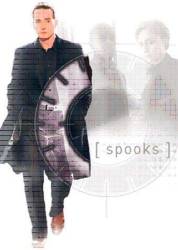Episode #4.1 - S4-E1
Character mistake: Ruth tells the Oxford professor that she read "Classics" at Oxford. That's a major mistake - Oxford doesn't offer "classics" as a course: it is called "Greats" (or "Lit Hum"), and is referred to as such by the students reading it. It might be one thing for an Oxford alumnus to call it "Classics" when speaking to someone not at Oxford, but they would never say it to a member of the Oxford faculty.
Episode #4.4 - S4-E4
Character mistake: A computer screen giving details of the villain of the week contains various spelling and grammatical errors: "Embassey", "Assination" and "Assination of with".
Episode #4.2 - S4-E2
Continuity mistake: The ladder carried by a bomber is a plain, ordinary ladder. After he puts it up against a post, it changes to an extendable one made up of three connected ladders.
Episode #4.1 - S4-E1
Character mistake: Ruth requests a search of London streets with the name "Achilles" in them. A list of streets appears on a computer screen, but when one of them is selected, it is spelled "Achillies."
Episode #4.2 - S4-E2
Other mistake: There is a scene set in the basement of Thames House. It is one of the most secure buildings in the country, but has graffiti on the walls.






Answer: The shots of the tube station closing and the shot of the concourse were shot at Marylebone station. There is also a shot of the tracks in which a sign is visible pointing to Southwark station and the Jubilee Line, and I suspect this is a stock shot filmed at Waterloo station.
Sierra1 ★